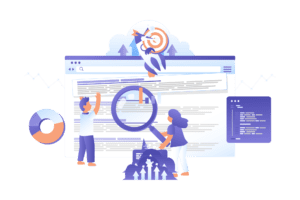Social listening allows you to get a feel for customer sentiment in your industry. It’s like a hidden window, allowing you to see into the hearts and minds of your customers and target audience. While you can conduct polls and rely on market research, you’ll be missing out on a lot of powerful information without social listening.
Here are six benefits of having a killer social listening strategy.
1. Identifying Leads
Listening to and engaging with customers and fans on social media will help you identify leads. You can notice people who are potentially interested in one of your products and services, based on the way they interacted with your content or how they replied to your posts.
While you can reach out to such leads with hard sells, that’s not the right course of action in most cases. It could work if the lead fits a very specific target profile, but generally, you’ll want to use a soft sell instead.
If you notice a potential lead asking about or recommending a product of yours, you can drop into the conversation, answer their question, or recommend another product they might like.
Social listening also allows you to find leads indirectly. You can discover which segments of your broader target audience respond better to certain products or a specific type of content. You can use that data when running outreach campaigns anywhere online to get more leads. By targeting the right people and using content they are interested in, you will get better results.
Moreover, social listening allows you to identify collaboration opportunities, not just leads you can sell to. You can discover like-minded bloggers, either in your niche or your area, who you can work with. That can help you get more local backlinks and local exposure. Local backlinks and local citations are super important for boosting your SEO rankings.
However, social listening is more about just identifying leads; it’s about identifying opportunities. Take the leads you will get from social listening and see them as part of the broader picture of discovering opportunities.
Before we continue, it’s essential to distinguish between social listening and social monitoring.
Social listening is a general term that refers to keeping an eye out for customer sentiment and conversations on social media, forums, and other sites where people interact with each other. Social monitoring is monitoring a specific social media campaign or monitoring for mentions of your brand.
2. Improving Customer Service
Social listening allows you to get insider information about the way customers perceive your business and its employees. People might not always complain about poor customer service to you directly; instead, they may vent about it on social media, forums like Reddit, niche-specific forums, or review sites.
All those sites should have a place in your social listening strategy. There may be certain aspects of your customer service strategy that customers don’t appreciate, and you may never learn about them until you start listening to what people are saying on social media, in online groups, and on forums.
It doesn’t even have to be something bad. Perhaps customers want to be able to communicate with you via WhatsApp, for example, yet you only offer phone or live chat support. Perhaps your response times could get better, or perhaps customers want you to be proactive about reaching out to them.
Furthermore, social listening allows you to improve the overall customer experience, leading to increased customer satisfaction. You can identify services, features, or products that customers want and start delivering them to your customers.
3. Understanding Customer Sentiment
Social listening is one of the best ways to accurately understand customer sentiment. Sending out polls and conducting market research can help, but it won’t give you the full picture. Sometimes, people won’t bother responding to surveys but will vent online if they are upset about something.
In addition, many consumers are active on social media but never take part in market research opportunities. Also, what customers tell you might not be what they truly feel, and that is especially true in certain niches.
Social media allows you to see how people respond and react to your brand – even if they don’t say anything. For example, are your followers “liking” a post that is critical of your business or policies, whether it is a negative article or one that is trying to be helpful by offering constructive criticism?
When you post content online, are people liking it? Are they sharing it with friends? If there’s a lot of engagement, it could go both ways, depending on the type of engagement: People may be feeling positive or negative about your brand. A lack of engagement can show that people are neutral about your company.
Facebook is particularly useful for understanding customer sentiment because users have several ways to react to a post.
Of course, when people use the angry react button, you can assume they are not satisfied with your business for some reason unless the content of the post was designed to make people angry.
However, even having a lot of people laugh-reacting to a serious post in which you promise to release a new feature might be a warning sign. Perhaps people don’t believe you because they felt let down in the past?
4. Boosting Online Reputation
Social listening is an excellent way to boost your reputation on the internet. First of all, social listening allows you to adapt your tone of voice, marketing, and messages to customer sentiment. However, it goes beyond that.
By having a good social listening strategy, you can quickly identify threats to your online reputation and respond to them right away.
Furthermore, you can interject yourself into conversations about your business in a fun and playful way. Engaging with customers on social media is always good for your reputation. It makes people think that you take the time to listen to customers and that you care about what they think.
Social listening allows you to empower your brand to start conversations and initiatives that will make you look more respected in the communities you target.
5. Finding Marketing Opportunities
Social listening is a great way to discover new marketing opportunities. You may not realize it at first, but social listening allows you to discover gaps in the industry – voids that you can fill. That could be a service, product package, discount, feature, or anything else that your competitors are not offering.
Listen out for things that people in your industry are frustrated with. Then, start campaigns that address those frustrations and show how you can solve the issues people are having.
Similarly, by listening to what people are saying, you can learn about what they respond to and use that in your marketing campaigns. We’re mainly talking about inbound marketing here – using content to draw people in and interact with your brand.
However, social listening can also allow you to find outbound marketing opportunities. Sometimes, followers will even suggest campaign ideas outright – don’t discard them just because they’re not coming from experienced marketers.
6. Keeping an Eye of Competitors
Finally, social listening allows you to keep track of your competitors and ensure you always stay one step ahead of them.
The first thing you should look out for is whether your competitors are planning on releasing new products, services, features, or discounts. Sometimes, rumors may go around about upcoming releases on social media, even if there is no official release from your competitor, so social listening provides a great way to learn about those possible releases.
Social listening also allows you to get a feel for how people think of your competitors and what your place in the industry is. Do people respond positively to your competitors? If so, why? What are your competitors doing to earn people’s trust and goodwill? How can you learn from your competitors to become better than them?
At the same time, social listening allows you to understand the ways people are not satisfied with your competitors. People may be upset or frustrated with your competitors, and social listening allows you to find out why.
You can then use that information to not make the mistakes your competitors are making. That way, people won’t express the same negative sentiment about your brand in the future. Even more than that, it provides an opportunity to position yourself as the leader in the industry, as a business that aims to please and doesn’t have the same drawbacks as the other players.
Of course, when it comes to competitor research, social listening should just be one trick up your sleeve. You should also use tools like SEMrush to track your competitors’ websites and content strategies.
Final Thoughts
If you don’t yet have a comprehensive social listening strategy, you’re missing out. The sooner you start, the better you will get a feel for consumer sentiment in your niche, and the more information and data you will gather. Over time, you’ll learn a lot more about the average consumer in your industry and consumer sentiment than you ever thought possible.





